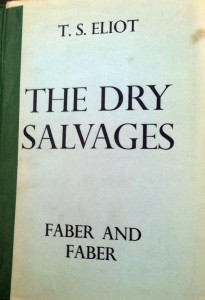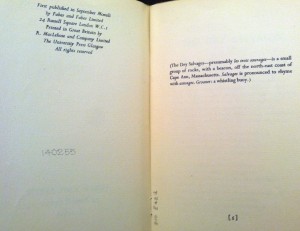The Dry Salvages
[Posted by Anisha Chakrabarti ’14, for Prof. David Rosen’s course, “Modern Poetry”]
 Going to the Watkinson Library to research T.S. Eliot was an astonishing experience, as I found that the collection included works from throughout Eliot’s life. The work I chose to examine was a copy of Eliot’s poem, The Dry Salvages. The piece is the third of four sets of poems that Eliot published later in his career entitled, The Four Quartets.
Going to the Watkinson Library to research T.S. Eliot was an astonishing experience, as I found that the collection included works from throughout Eliot’s life. The work I chose to examine was a copy of Eliot’s poem, The Dry Salvages. The piece is the third of four sets of poems that Eliot published later in his career entitled, The Four Quartets.
While the first time the poem was published was in February of 1941 in an edition of New English Weekly, this version was published in September of the same year and is the first edition of its publication alone.
The poem is not particularly long; therefore it surprised me that it was published on its own in such a sparse manner. It is slightly flimsy; the book cover is cardboard, and it is bound in an elm green binding that has been reinforced by green tape. The pages are yellowed, but do not look particularly worn. The book cover says nothing; it is only when you turned to the title page that very simply, T.S. Eliot, The Dry Salvages, Faber and Faber is printed. This made me think that perhaps the edition had been published originally with a compilation of other works.
 Faber and Faber is printed quite largely on the title page, so I looked up what the publishing company was. The second page describes the publishing as being done in London. Upon research, I learned that the editor of Faber and Faber was in fact, T.S. Eliot. This means, that he had completely control and editorial power over this piece, and approved it. It would then make sense, that he could have released his own work on its own, regardless of its length. This made me question the format of the font and layout of the piece in relation to the time period in which it was published.
Faber and Faber is printed quite largely on the title page, so I looked up what the publishing company was. The second page describes the publishing as being done in London. Upon research, I learned that the editor of Faber and Faber was in fact, T.S. Eliot. This means, that he had completely control and editorial power over this piece, and approved it. It would then make sense, that he could have released his own work on its own, regardless of its length. This made me question the format of the font and layout of the piece in relation to the time period in which it was published.
Eliot’s pieces contain such complexity; it made me wonder if that was the reason for the simplicity in the format of the publishing. I then considered the time period in which the piece was published. Eliot had been working on the piece during the air raids of Great Britain during World War II. So the simple paper, short work, lack luster binding, and plain fonts may have been a result of a lack of resources during the war.
Although the piece was published in Great Britain, and was written there, its title is derived from a rock formation that is located on Cape Cod, Massachusetts, as Eliot indicated on the third page before the poem begins.
I was first attracted to this piece in the Watkinson because I was interested in its autobiographical nature that Eliot was writing about during his later life. The Dry Salvages includes references to Gloucester Harbor, where Eliot would go sailing as a child. I thought it was intriguing that how even though he essentially ex-patrioted, at a later time in his life he was writing about his childhood in the United States. It makes sense, as it was a time of disorder in his new home of Europe that he would be reflecting on his earlier American life.
What I found most striking about The Dry Salvages in relation to studying early Eliot and why it was also very interesting to read because of its similarity to the section, Death by Water in the Wasteland. Eliot was writing almost 20 years later, yet many images and themes of life as being a boat adrift, as well as the sea, from Death by Water are still imminent in The Dry Salvages, yet it was a more hopeful poem than the Wasteland.
In the original, pre-edited manuscript of The Wasteland, you see the much longer IV. Death By Water, and in the original, Eliot references “The Dry Savages,” and comments on it in his notes. This did not make the final version of The Wasteland, but was clearly an idea that Eliot thought about even twenty years later and that he went back to in The Dry Salvages.